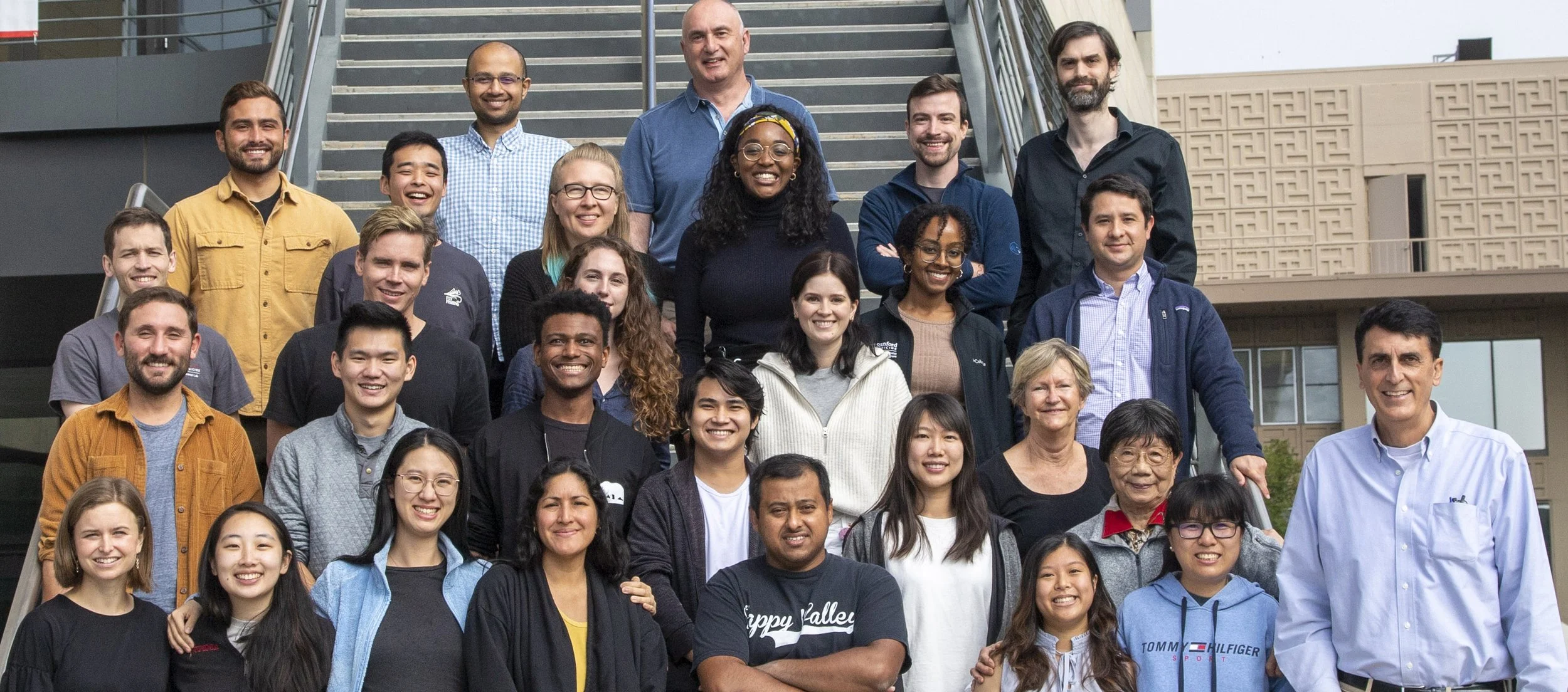


Join Us
Join Us
Laboratory Culture
The Khavari lab embodies a non-hierarchical structure designed to facilitate synergy among staff, postdoctoral fellow and Ph.D. student lab members. High degrees of intra-lab assistance and collaboration, combined with active collaborations with other groups at Stanford and beyond are common lab practice and enable acceleration of project momentum. A focus on innovation in core areas of –OMICS, informatics, genetics, and therapeutics is purposefully combined with systematic dissemination of new advances among lab members to enhance synergy. Weekly lab meetings are designed to maximize critical project feedback and brainstorming.
Postdoctoral, graduate student,undergraduate student, computational biology team members, and technician staff applicants are welcome to the lab.

Khavari Lab
Khavari Lab
Postdoctoral Fellowships
Postdoctoral fellowship training in the Khavari lab emphasizes combinatorial acquisition of unique capabilities in –OMICs, computational biology, and cutting edge genetic model systems combined with research leadership experience via directing a group of students and technicians in the lab. This training approach is designed to maximize preparation and success for career paths of interest to the individual postdoc, including Principle Investigator roles in academia and industry. For postdoctoral fellows pursuing an academic career, grant writing skill is advanced by mentored completion of F32 level NIH training awards followed by K-level NIH career development awards. 15 former trainees are now P.I.s in academia at institutions that include UCSF, Yale, Stanford, UCSD, Penn, Northwestern, and Duke. 6 are group leaders in industry at leading companies, such as Merck, Genentech, Personalis, and Medimmune.
The Khavari lab is currently recruiting postdoctoral fellows. Postdoctoral applicants can email a letter of interest and CV that includes three references to Dr. Khavari at the lab. Postdoctoral research in the lab commonly involves close interactions both within the lab and with collaborating groups at Stanford University and at other institutions. Postdoctoral training includes participation in seminars and retreats of the Stanford Program in Epithelial Biology, the Stanford Program in Cancer Biology and the Stanford Institute for Stem Cell Biology and Regenerative Medicine.
General information about postdoctoral fellowships at Stanford may be found at the Stanford Postdoctoral Scholars site.
Graduate Students
Ph.D. training in the Khavari lab emphasizes expertise in the primary areas of laboratory innovation A) –OMICs [including genomics, proteomics, and metabolomics] B) cutting edge genetic models C) informatics for analysis and modeling using high dimensional data generated by –OMICS approaches D) therapeutics. In concert with the qualifying exam process and with competitive fellowship applications, students learn grant writing skills. Senior Ph.D. students commonly supervise Stanford undergraduates and research interns to gain leadership skill in directing group efforts. A substantial majority of former graduate students in the lab have pursued an academic postdoctoral fellowship at institutions that include the NIH, Stanford, UCSF, Vanderbilt, MIT, and Harvard.
Stanford in a Biosciences PhD program who are interested in a rotation can email Dr. Khavari at the lab.
The Khavari lab is currently recruiting PhD students. PhD students in the lab have come from a variety of home programs, including Biochemistry, Biology, Cancer Biology, Biomedical Informatics, Stem Cell Biology & Regenerative Medicine, Chemical & Systems Biology, and Genetics. Graduate education in the lab is enriched by the large and diverse graduate student community within the core labs of the Stanford Program in Epithelial Biology, which supports a monthly graduate student-only dinner where students share protocols, reagents, and ideas. Prospective graduate students are encouraged to apply to the Stanford Combined Biosciences PhD program. Students already enrolled at Stanford in a Biosciences PhD program who are interested in a rotation can email Dr. Khavari at the lab.
Undergraduate Students
Undergraduate students in the lab participate in an intensive research experience working closely with a postdoctoral fellow or PhD student mentor. Undergraduate student efforts are focused on preparation for future PhD studies in the biosciences and require initiation by the Spring Quarter of freshman year with an envisioned college career-long commitment that include full-time summer work. Students interested can email Dr. Khavari at the lab.
Computational Biology Team
Applicants for bioinformatics positions in the lab should send a letter of interest and CV that includes three references to Dr. Khavari.
Technician Staff
Applicants for technical positions in the lab should send a letter of interest and CV that includes three references to Pam Bernstein, Administrative Director for the Stanford Program in Epithelial Biology.